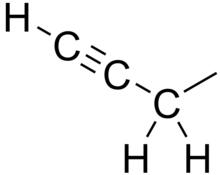Propargyl
In organic chemistry, propargyl is an alkyl functional group of 2-propynyl with the structure HC≡C−CH2−, derived from the alkyne propyne.

Chemical structure of the propargyl group.
The term propargylic refers to a saturated position (sp3-hybridized) on a molecular framework next to an alkynyl group. The name comes from mix of propene and argentum, which refers to the typical reaction of the terminal alkynes with silver salts.
The term homopropargylic designates in the same manner
See also
References
- Ferreira, Franck; Denichoux, Aurélien; Chemla, Fabrice; Bejjani, Joseph (2004). "Highly Diastereoselective Syntheses of Propargylic Acid and Homopropargylic Systems". Synlett (12): 2051–2065. doi:10.1055/s-2004-832816.
This article is issued from Wikipedia. The text is licensed under Creative Commons - Attribution - Sharealike. Additional terms may apply for the media files.